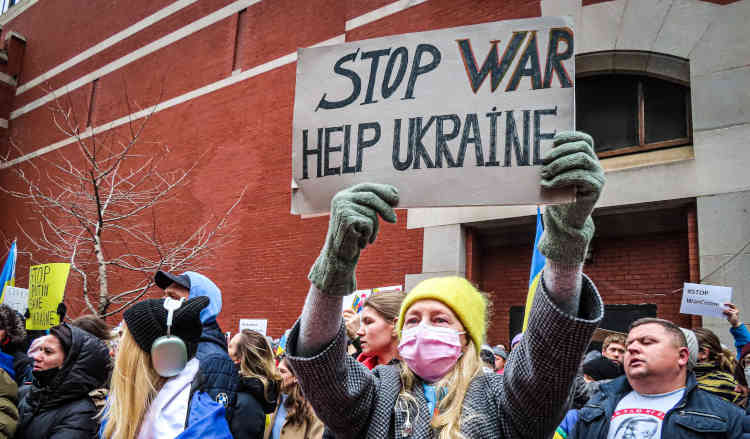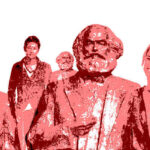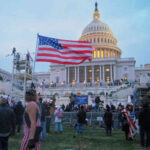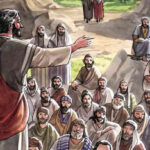The war in Ukraine, and Russia’s aggression, can arouse strong emotions, especially in those with a strong sense of justice. We can pray, of course, but it hardly seems enough somehow.
What would Jesus do?
I was a soldier once
My parents were mildly socialist but my dad fought in the second world war, so I was brought up with an acceptance that protecting ourselves was right and war was sometimes necessary and justified.
By the time I was in my late teens I was a christian attending a conventional conservative church. The Vietnam war had commenced, and I absorbed the general vibe that fighting the spread of Communism was right and proper for a christian.
This feeling was reinforced by the visit to our church (on a weeknight) of a group named the Christian Anti Communist Crusade. It’s hard to believe now that they actually used the word “crusade”. And they saw the fight against godless communism as a spiritual matter.
When Australia joined the US in the futile Vietnam war, the government needed extra troops, so they introduced conscription. Again, it is hard to believe now. But every 6 months there was a lottery (literally) where birthdays in the next 6 months were drawn out of a lottery barrel, and those whose birthdays came out were conscripted into the Australian Army for 2 years.
It was one lottery I didn’t want to win, but my number came up. After deferral to complete university, I had to report to the army at the end of January 1969 for my “National Service”
Conscientious objection was available to a few, but I believed in the war, didn’t I, just as I had been taught. So off I went and became a “nasho”.
A soldier’s life is ….. awful!
I met some interesting people, had some fun times and I learnt a lot about life, but overall I absolutely hated it. I’m not the macho type, I don’t like guns and I don’t really enjoy all male company, as the army was back then. I had only been married eighteen months, and I wanted to be back home.
Most of my fellow nashos were normal high-spirited Aussie guys and they were half looking forward to running around with guns. But by the end of the first month of recruit training, they were all groaning under the discipline while I was mildly relieved to find it wasn’t quite as bad as I had expected. I was mostly a submissive and therefore competent soldier, but I had a few brushes with authority that fortunately didn’t come to anything.
I wasn’t required to go to Vietnam and be part of the fighting – I think I would have refused to go – and so I stayed in Eastern Australia.
Time to think
Unexpectedly, the army provided time to think. Drill, exercises, long marches and nights in a hut with no TV were all opportunities to reflect. Vietnamese war stories from our trainers (probably highly exaggerated), official films and the behaviour of trainers and nashos all provided food for thought.
I remember one exercise in the Blue Mountains west of Sydney, somehow my name was omitted from all the rosters. Using a tactic I learned at school when I was sent out of the classroom (it happened a few times, mostly for talking too much!) I made myself scarce. On several days I made my way out of the camp and went bushwalking. And thought a lot, about God, life and my christian faith.
And through it all I learned some important things.
The army was a degrading place, I felt. I don’t think it is easy for a normal person to kill a fellow human being, so the army has to somehow make recruits willing. Recruit training was quite tough and the language of the trainers towards women and the enemy was degrading and (to my mind) disgusting – but all aimed, I believe, at macho male bonding and de-sensitising.
Some of the Sergeants and Corporals who trained us were sensitive and thoughtful, but I thought most of them were affected by this insensitive attitude. And some of the recruits were affected too.
(I should add that I expect the army is a different place now, half a century later.)
At the same time, I was thinking about my own spiritual state and the state of the church. I came to the conclusion that both needed a shot in the arm. I began to think about the Sermon on the Mount.
I came out a different person
After two years I was discharged, but I wasn’t the same person. I was two years older and a little more aware of a side of life I hadn’t experienced before.
But more importantly, I had come to the conclusion that the Sermon on the Mount wasn’t just hot air or vague aspiration. Jesus really meant that stuff.
And that included non-violence.
After all, he said to love our enemies and pray for them, to turn the other cheek when attacked. He didn’t say to kill them. He said to treat others as I’d like to be treated, and again, that meant not killing them.
I never called myself a pacifist, but I was close. I could see there might be situations where violence was the best of a bad lot of options. Sometimes one act of violence might stop much larger violence. Like the trolley problem I guess and just as Dietrich Bonhoeffer found out. But my wife and I discussed the possible implications if our family was ever under threat.
And so I have been strongly opposed to actions like the Second Gulf War, and generally critical of other use of force by Australia and its allies.
And then came Putin
Fast forward to Russian involvement in Chechnya, Georgia, Crimea and now the whole of Ukraine.
Like so many others, I feel outraged that someone who has gained such great power by extremely doubtful means, and maintained it by threat, intimidation, violence and novochok, should be able to order his large army, against clear public opinion, to invade and destroy and kill.
I feel even more outraged that he wears a cross, is a member of the Russian Orthodox Church, and one of his alleged intentions is to gain control of Kyiv, the spritual home of the Russian church because that was where Russian christianity began.
What does a good christian boy do?
Of course I pray. I pray for the Ukrainian people, especially the President and the christians and the separated families. And I donate. And I watch the progress of the invasion.
And I must admit, sometimes I want NATO to get involved militarily. I want to see the Russian advance smashed.
And then I remind myself that those Russian soldiers have wives and children and mothers praying for them to come home safe, just as the Ukrainian defenders do. And probably they don’t want to be there either, aiding a crazed President who will likely be judged to be a war criminal. I don’t want them to die just as I want the Ukrainians to be safe.
And so I pray that somehow the Russian people, the oligarchs, the politicians, the senior military, might rise up and refuse to follow Putin’s orders. That somehow the sanctions will do their work, and quickly.
The dustbin of history?
Europe has, in the main, been a peaceful place since the end of World War 2. There was a bloody and brutal conflict on the eastern edge of Europe in the Balkans, but western Europe has been a bastion of liberal democratic values. Even the fall of the communist Soviet Union occurred with minimal violence. So Putin’s response to his unrealistic demands on Ukraine has been shocking to the west.
It would have been possible for NATO to defend Ukraine, mostly with US arms and forces. But they have chosen not to. Ukraine isn’t a member of NATO, so there is no obligation. Entering into conflict with Russia would have an enormous cost in lives and financially.
So NATO is playing the long game, accepting that Russia’s invasion will succeed, but at such a cost to the Russian economy and citizens that Putin will have to back down or be deposed. It won’t be pretty, it may not even be successful.
But it will probably be the closest to the principles in the Sermon on the Mount as we can get in this dispiriting time.
So will Putin’s strategy of warfare and mass destruction be swept into the dustbin of history? Will he be relegated to the same page of the history book as Hitler and Slobodan Milošević? Or will NATO’s strategy of avoiding killing be found to be a failure?
It is hard to be a pacifist
I am conflicted about all this. It is appalling to think of Russia annexing Ukraine (even if only short term) and removing a brave and innovative President.
It is appalling to see families separated, perhaps permamently, by distance and sometimes death.
Fortunately I am not a decision-maker, so my confusion has no practical effect.
But I do wonder what would Jesus do. And I suspect he would support NATO’s approach.
I pray it will lead to a good outcome. That this war won’t be resolved by an avalanche of bodies. But by truth and justice and prayer.
Photo by Katie Godowski from Pexels





I had no idea that military service has had such an effect on you, UnkleE. I didn’t even know you had been conscripted, even though that should have been evident to me. So obviously I have no experience with conscription.
As for me, I’m quite solidly in camp “keep NATO out of this as much as we can”, although I am open to providing air support to an extent. In wars the biggest risk is that the civilian population takes the highest number of casualties. The atrocities committed by Russia are, however, certain to pile up now that they are shelling nuclear power plants and bringing brutal militias into Ukraine. Unfortunately the prospects of a palace coup or popular uprising in Moscow are very slim.
One thing that a pacifist or dovist can do is donate money to humanitarian aid.
Hi IN, nice to hear from you. Hope life is going well with you. I’d love to hear what you’re doing these days if you want to send me an email sometime?
I don’t suppose I had any reason to talk about my time in the army, but it certainly changed a few things in both of us.
Interested to hear your view of whether NATO should get involved. I imagine it would be the prevailing view in Europe? I do wonder if NATO countries might be doing a bit to support Ukraine militarily without any fanfare. And I do agree with you that the best hope is moves against Putin at home, but that isn’t looking very likely yet.
I admire Zelensky, and hope he gets out of this alive.
If you like, you can send an email to the address used in this reply.
No, it is not the dominant view in Europe. Generally speaking, European governments are less eager for a harsh approach against Russia than the US, although a lot has changed since the invasion began. In the United States there is a large grouping of Republican war hawks, you do not see an equivalent bloc in Europe.
Same here.
What good is the ‘United’ Nations when Russia can veto anything it doesn’t like ?
Better to end the farce and for democracies to withdraw and disband the UN and reform with only countries that respect democracy and human Rights.
A stand will need to be made sooner or later and a line has to be drawn somewhere.
Hi Ignorantia Nescia
Thanks for your reply. I missed it coming in I’m sorry. I’ll send you an email.
Hi “West”
I think I disagree with you on this one. I think it depends on what we see as the UN’s role. If it was the world’s policeman, and it had force to back it up, and if that was a morally acceptable line to take, then I’d agree with you. Kick Russia out and use force to stop things like this invasion.
But I don’t think it can work as a policeman, nor should it. I think it has to be a forum where things are discussed, moral pressure is used, compromise is sought and resolutions are realistic. I think takinga way some of Russia’s power and influence might be good, but I feel it is best to have them still there to hear what other say, be forced to try to explain themselves, and to see if some compromise can be hammered out.
I don’t like the situation, but I think we have to be realistic.
Hi unkleE,
I hear what you are saying and agree to an extent. Better to talk and be able to apply diplomatic pressure that not to have lines of communication open. The thing I object to is one country being able to veto the opinions of everyone else That really makes them impervious to any meaningful action from the UN apart from words.
That means that the West has to take action outside the UN as it is doing now anyway, so really the UN is just a forum without teeth. I find that a bit frustrating as Russia could just walk out or ignore everyone else. An alternative is for the West to remain in the UN but form expanded alliances like NATO, AUKUS, etc but on a global basis.
Anyway, I think that the West is doing as much as it can under the circumstances. Sanctions will obviously hurt Russia and any reputation it had as a country that could be trusted in negotiations, whether economic or otherwise is trashed for a long time. It might become another ‘hermit’ State like North Korea.
Yes we are pretty close in our assessment of the realities. I too hate it that Russia, or anyone else, can veto, but that reflects their supposed power, at least in terms of nukes (their army isn’t looking so powerful right now!).
But If they tried to re-organise the UN, it would be very difficult to reach a consensus. e.g why are UK and France still on the Security Council – they aren’t all that powerful now. A new Security Council might have US, Russia, China, then maybe NATO and some conglomerate representing the third world, but I don’t see how it would actually happen.